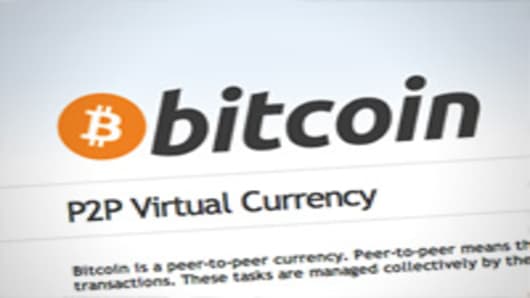Bitcoin is striving to be a global currency of sorts—one that's not backed by any government or institution. Bitcoins aren't cash, technically. They're an entirely virtual currency. Users exchange online credits for goods and services from select retailers, contractors and online trading houses.
Rather than going through a bank or financial institution, these credits—called tokens by users—are exchanged directly from person to person.
When a transaction occurs, the bitcoin is automatically sent from the buyer to the seller through an encrypted method that's designed to ensure bitcoins can’t be hacked or artificially created.
What’s the point of bitcoins?
Bitcoin's creators like to position the currency as an alternative to the dollar and Euro. They hope to revolutionize the world of finance just as the Web has proven to be a paradigm shift in the publishing world.
That's a lofty (and likely impossible) goal, but it wisely taps into people's frustration and anger with banks following the 2008 financial crisis. By moving the transaction process to a peer-to-peer level, banks are removed from the process, which also lowers fees for both users and businesses.
The process also lets people conduct transactions with virtual (but not complete) anonymity, perhaps the biggest key to its success so far. And as online transactions continue to grow and online data theft becomes a more common occurrence, bitcoin backers see an opening for the system.
How is Bitcoin different from Paypal?
Paypal and other online payment services are reliant on existing financial institutions to work. Your account is generally tied to a credit card or a checking/savings account—meaning that whenever you spend money, you're subject to the same restrictions and limitations you would have for using those. So, let's say you had tied your PayPal account to Visa with a $2,000 credit limit. Before making an online purchase in excess of that amount, you'd have to arrange for a credit extension or make changes to the source PayPal was drawing from. Using bitcoins, users can spend as much as they want—as long as they have a sufficient number of coins to cover the charge.
At the same time, because there's no way for a bitcoin account to be frozen, users can transfer funds wherever they like. For example, last year PayPal (as well as Visa and MasterCard ) blocked users from donating funds to WikiLeaks. Bitcoin donations, however, went through without a hiccup.
Are there other virtual currencies like bitcoins?
Not really. Bitcoin is something of an anomaly. There are some other existing e-currencies, such as Second Life's Linden dollars, but those are generally restricted to the game world. When it comes to real world services, bitcoins are pretty much all that's used today.
There have been other attempts at virtual currency, though. Several years ago, there was a gold-backed digital currency called e-gold that showed some promise, but it was eventually shut down due to rampant money laundering and illegal exchanges.
There are, of course, fears that those same activities will once again become prevalent with bitcoins. But because the currency is exchanged on a peer-to-peer basis, much like BitTorrent files are, it will be harder for a government to it shut down permanently.
How do I get and spend bitcoins?
The first thing you do is set up what's known as a "bitcoin wallet." Here you'll store your coins and keep your dashboard for any transactions. You can either download a program to your PC and install it, or get one online (at sites like Instawallet or MyBitcoin). In either case, it looks a lot like what you see when you log on to your bank account via the web.
From there, you'll need to fill your wallet with bitcoins. If you're the patient type, you can 'mine' them (see below), but most people buy them with real world cash via online currency exchanges, such as Mt. Gox or TradeHill.
Once you've stocked up on bitcoins, you're free to spend them—assuming you can find a vendor that accepts them. If you're looking to hire an individual, such as a graphic artist to work on a project for you, or prefer to shop from very small Etsy-like merchants, it's pretty easy.
Bitcoins are a bit harder to spend in your real world, day-to-day life, but an increasing number of establishments are accepting them. These include New York City's Meze Grill, the Howard Johnson Hotel and Conference Center in Fullerton, Calif., (near Disneyland) and Sugar, an Oklahoma City wedding cake shop. The number of vendors that accept bitcoins is increasing regularly—and includes both online and physical vendors.
(Also, as mentioned above, due to the assumed anonymous nature of transactions, bitcoins are also being used to purchase illegal drugs via well-hidden Web sites.)
When you're ready to make the transaction, whatever kind you choose, you'll open up your bitcoin wallet and digitally transfer the amount to an address the merchant provides. Rather than the typical "john@yahoo.com" addresses you're used to, though, the transfer address will be an illegible string of 30-40 randomly generated numbers and letters—eliminating the need to know who, exactly, you're doing business with.


